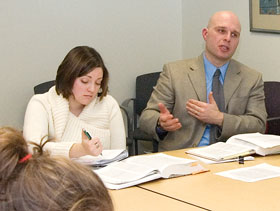  |
| HOME | THIS ISSUE | CALENDAR | GRANTS | BACK ISSUES | < BACK | NEXT > |
Discussion key to understanding Shakespeare, says Teaching Fellowby Richard Veilleux - March 27, 2006 |
||||
|
As an undergraduate, Gregory Semenza saw college as a place to have a good time, study a little, play some sports, and meet a few co-eds. By his own admission, he was a “lousy” student, barely on the cusp of average. Then, in his sophomore year at Rutgers, he met King Lear. “By the end of the year, I was going to be a Shakespeare scholar,” he says, sitting in his relatively spare office in the CLAS Building, a skull and other trinkets perched just behind his shoulder on the window sill. “It was a mandatory class on Shakespeare, and I fell in love with him.” Flash forward a mere nine years and Semenza was building his Shakespearean repertoire at Penn State, where he earned his master’s degree in 1997 and his doctorate in 2001. He also won the Graduate Teaching Award for Outstanding Teaching in 2000 while at Penn State. Three months after graduation, he began his career in UConn’s English department, teaching Shakespeare, Milton, and 17th century literature. Last year, Semenza was one of three professors named a University Teaching Fellow and, in the same year, he was selected for an AAUP Excellence Award for Teaching Promise. Semenza mixes lecturing with class discussion. “With Shakespeare, a certain amount of lecture is required,” he says. But, he says, “I prefer setting up problems the students have to solve through discussion. In Hamlet, instead of just explaining why he doesn’t avenge his father’s ‘foul and unnatural’ murder, considering the prince’s character and personality, I’ll ask them why should he? Why shouldn’t he? Almost all the students will have a different take on the question.” Robert Hasenfratz, an associate professor of English, says Semenza “challenges students directly, not in an overtly confrontational way, but by putting difficult and possibly disturbing material in front of the students and letting them argue the case.” Is Shakespeare tough? “Sure,” says Semenza, “it often is. Too often it’s because the language is so difficult, that teachers believe they have to tell the students what it is, what it means. I like to do the opposite – key into the internal conflict in his writings and make them work through it.” Drama, he says, “is not a controlling medium. It offers a variety of options on how to stage each play. I tell the students there may be any number of right readings – that frees them up from having to face this God-like author.” Students appreciate Semenza’s teaching style.
“Never really cared for Shakespeare until I took this course,” one student wrote in an online comment. “Semenza was interesting, funny. His tests are fairly tough and class participation is hard, but overall a great course.” Semenza appreciates students who accept a challenge and succeed, especially those who may have struggled a little in high school. It’s one of the reasons he enjoys teaching at a public university, “where the average student is capable of doing great things. “I really believe in public education, and the range of students we see,” he says. “These are kids who don’t take what they have for granted. They understand hard work.” Semenza’s courses aren’t easy, and he makes that clear in his syllabi. He warns of the importance he places on attendance, and tells his students he expects “spirited” participation, and “professionalism.” He gives unannounced quizzes on a nearly weekly basis, and assigns papers regularly. He often shows films in his Shakespeare classes, but insists that it isn’t “some cheesy way to get out of doing work. “When they see two films about a play that approach it in diametrically opposing ways, it frees them to understand there are many ways to look at Shakespeare’s writings,” he says. “It puts them at ease. And gives them insight.” Semenza has his students watch West Side Story and then the 1996 version of Romeo and Juliet with Leonardo DiCaprio, and then discuss the way the films staged the ending. “Invariably, the students will come to see that West Side Story is darker,” he says. “Either way, they’ll argue about it. They’re thinking critically, and they’re very articulate. That’s what I’m looking for.”
|
| ADVANCE HOME UCONN HOME |

